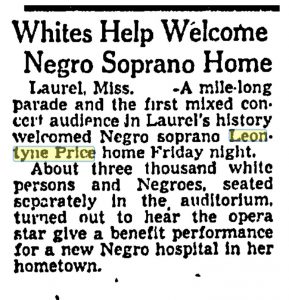
Leontyne Price made her Metropolitan Opera debut in January 1961 as Leonora in Giuseppe Verdi’s Il Trovatore, pictured here.
Leontyne Price is known as the first Black leading performer in opera. She was the first Black prina donna to gain an international reputation and become a singing superstar in the world of opera. Born as Mary Violet Leontyne Price on February 10, 1927, she grew up singing in the church choir and only decided to pursue music after she graduated from the College of Education and Industrial Arts, now Central State University.1 She then attended the Julliard School of Music and began her singing career on Broadway in 1952. She made her operatic debut in 1957 and continued traveling the world singing opera until 1985 when she switched to more recital work.2 Her role in Verdi’s Aida remains her best-known work, and she is widely considered the most stunning Aida this world will ever see (see video below). Price was an incredibly accomplished artist and received numerous awards, including 20 Grammys, the Presidential Medal of Freedom (1964), the Kennedy Center Honor (1980), the National Medal of the Arts (1985), and is a National Endowment for the Arts Opera Honoree. 3 Today, at age 96, she continues to inspire upcoming generations of Black classical musicians.
I found this snippet of a newspaper from the Kansas Whip in 1955 titled “Whites Help Welcome Negro Soprano Home”, describing the large mixed-race crowd that greeted Price for a benefit concert in her birth town of Laurel, Mississippi. 4 I found this title to be extremely diminishing of Price’s accomplishments as an artist – according to the snippet, it was the largest gathering of White and Black people in Laurel’s history. To title this as “Whites Help Welcome Negro Soprano Home” is centering White people once again in a story that should be centering Black voices and celebrating Price’s artistry and accomplishments. It reminded me of the conversations we have had in class about White saviorism and White guilt – once again, White people are making themselves the heroes of someone else’s story.
We can only begin to comprehend the struggles that Price had to overcome as a Black woman in the opera industry, which is a racist and almost exclusively White-dominated industry to this day. Take the Met, for example. With a board of 45, only 3 managing directors are Black.5 Bass-baritone Morris Robinson said in a New York Times article about representation in opera: “In 20 years, I’ve never been hired by a Black person; I’ve never been directed by a Black person; I’ve never had a Black C.E.O. of a company; I’ve never had a Black president of the board; I’ve never had a Black conductor,” Mr. Robinson said. “I don’t even have Black stage managers. None, not ever, for 20 years.”6
Representation in opera is still a huge issue today and racism is prevalent, especially considering the mostly old and white audience that opera attracts. Hopefully, as time goes on, we will center Black artists in the world of opera. Artists like Leontyne Price are an inspiration, but also a reminder of how far we still have to go to achieve equity in the world of opera.
“I am here and you will know that I am the best and will hear me. The colour of my skin or the kink of my hair or the spread of my mouth has nothing to do with what you are listening to.” – Leontyne Price
1 Britannica, T. Editors of Encyclopaedia. “Leontyne Price.” Encyclopedia Britannica, October 3, 2023. https://www.britannica.com/biography/Leontyne-Price.
5 Barone, Joshua. “Opera Can No Longer Ignore Its Race Problem.” The New York Times, The New York Times, 16 July 2020, www.nytimes.com/2020/07/16/arts/music/opera-race-representation.html.

